使用通配符在word中实现高级查找和替换
Word操作高级查找替换搜索
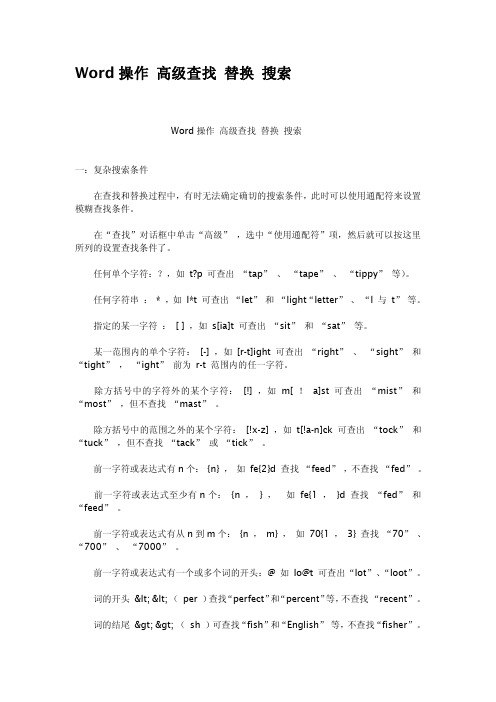
Word操作高级查找替换搜索Word操作高级查找替换搜索一:复杂搜索条件在查找和替换过程中,有时无法确定确切的搜索条件,此时可以使用通配符来设置模糊查找条件。
在“查找”对话框中单击“高级”,选中“使用通配符”项,然后就可以按这里所列的设置查找条件了。
任何单个字符:?,如t?p可查出“tap”、“tape”、“tippy”等)。
任何字符串:*,如l*t可查出“let”和“light“letter”、“l与t”等。
指定的某一字符:[],如s[ia]t可查出“sit”和“sat”等。
某一范围内的单个字符:[-],如[r-t]ight可查出“right”、“sight”和“tight”,“ight”前为r-t范围内的任一字符。
除方括号中的字符外的某个字符:[!],如m[!a]st可查出“mist”和“most”,但不查找“mast”。
除方括号中的范围之外的某个字符:[!x-z],如t[!a-n]ck可查出“tock”和“tuck”,但不查找“tack”或“tick”。
前一字符或表达式有n个:{n},如fe{2}d查找“feed”,不查找“fed”。
前一字符或表达式至少有n个:{n,},如fe{1,}d查找“fed”和“feed”。
前一字符或表达式有从n到m个:{n,m},如70{1,3}查找“70”、“700”、“7000”。
前一字符或表达式有一个或多个词的开头:@如lo@t可查出“lot”、“loot”。
词的开头<<(per)查找“perfect”和“percent”等,不查找“recent”。
词的结尾>>(sh)可查找“fish”和“English”等,不查找“fisher”。
二:EQ域的应用Eq是Equation(公式)的缩写,Eq域能够生成数学公式。
创建公式当然最好用“公式编辑器”了,但在某些情况下使用Eq域来输入简单的数学公式也是一个不错的选择。
word 查找的通配符高级篇

word 查找的通配符高级篇我们在进行查找、替换文档内容时,再配合通配符这一有利武器,将使我们很好的完成Wo rd查找替换操作,从而提高工作效率。
下面我们将以实际列子配合讲解Word查找替换中通配符的使用。
1、“>”通配符该通配符代表查找以××结尾的目标对象。
用来指定要查找对象的结尾字符串,比如说要是记不清所要查找对象的完整内容,但记得要查找对象的结尾字符串是某个特定的字符,就可以用“>”来将这个特定字符表达出来,这样word程序就自动去查找以这个特定字符结尾的相关内容了。
例如:将文件中以“en”结尾的所有目标对象找出来。
方法是:按CTRL+F,点击“高级”,勾选“使用通配符”。
然后在查找框中输入“en>”,就可以查找到“ten”、“pen”、“men”等等。
注:在结合“使用通配符”进行查找替换时,都必须先勾选“使用通配符”,才能正确查找替换。
2、“<” 通配符它与“>”正好是相对的一组通配符,所以,我们可以用它来查找以某字母开头的对象。
3、“?” 通配符该通配符是用来代表任意单个字符,当大家不清楚查找目标中指定位置的内容是什么的时候,就可以用“?”来代替,几个“?”就代表几个未知字符。
例一:比方说,要是大家在查找对话框中输入“?家”的话,word程序就可以找到类似“大家”、“国家”、“全家”之类的目标内容。
例二:输入“???家”的话,就能找到“保卫国家”之类的内容。
例三:输入“?土”的话,Word查找工具就可以找到类似“黑土”、“黄土”之类的目标内容。
例四:输入“??土”的话,就能找到“五色土”之类的内容。
4、“ *” 通配符“*”可以用来代替任意多个字符。
实例:比如我们输入“*国”,就可以找到“大国”、“法兰西国”、“中华人民共和国”等字符串内容。
5、“ @” 通配符该通配符可以用来查找字符中包含一个以上的前一字符。
实例:例如,如果输入“me@n”的话,Word查找工具就可以找到“men”、“meen”之类的字符内容了。
Word中的查询和替换功能的高级应用
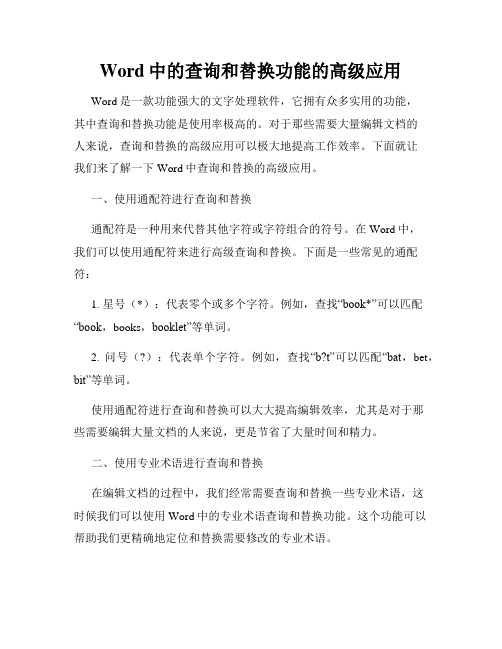
Word中的查询和替换功能的高级应用Word是一款功能强大的文字处理软件,它拥有众多实用的功能,其中查询和替换功能是使用率极高的。
对于那些需要大量编辑文档的人来说,查询和替换的高级应用可以极大地提高工作效率。
下面就让我们来了解一下Word中查询和替换的高级应用。
一、使用通配符进行查询和替换通配符是一种用来代替其他字符或字符组合的符号。
在Word中,我们可以使用通配符来进行高级查询和替换。
下面是一些常见的通配符:1. 星号(*):代表零个或多个字符。
例如,查找“book*”可以匹配“book,books,booklet”等单词。
2. 问号(?):代表单个字符。
例如,查找“b?t”可以匹配“bat,bet,bit”等单词。
使用通配符进行查询和替换可以大大提高编辑效率,尤其是对于那些需要编辑大量文档的人来说,更是节省了大量时间和精力。
二、使用专业术语进行查询和替换在编辑文档的过程中,我们经常需要查询和替换一些专业术语,这时候我们可以使用Word中的专业术语查询和替换功能。
这个功能可以帮助我们更精确地定位和替换需要修改的专业术语。
使用专业术语进行查询和替换需要首先在Word中设置所需的术语表。
设置方法为:在“文件”选项卡中选择“选项”,点击“证章管理”中的“新建”按钮,输入术语名称和定义,即可成功设置。
三、使用格式文本进行查询和替换在Word中,我们可以使用格式文本进行高级查询和替换。
例如,我们可以使用格式文本找到所有红色字体并将其替换为蓝色字体。
此外,我们还可以使用格式文本寻找所有下划线,并将其替换为粗体。
使用格式文本进行查询和替换需要先选择“更多”按钮,然后在“格式”选项卡中进行设置。
使用格式文本进行查询和替换可以快速定位和修改需要修改的文本格式。
四、使用插入符号和特殊符号进行查询和替换在Word中,我们还可以使用插入符号和特殊符号进行高级查询和替换。
例如,我们可以使用插入符号和特殊符号寻找所有箭头并将其替换为竖线。
如何在Word中使用查找和替换的高级选项的通配符和正则表达式
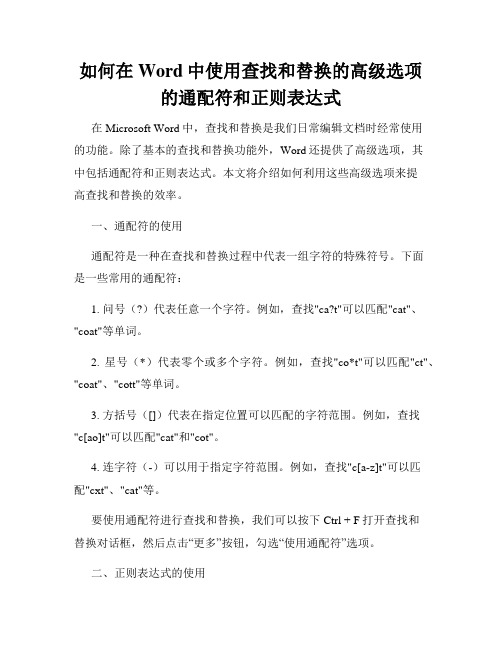
如何在Word中使用查找和替换的高级选项的通配符和正则表达式在Microsoft Word中,查找和替换是我们日常编辑文档时经常使用的功能。
除了基本的查找和替换功能外,Word还提供了高级选项,其中包括通配符和正则表达式。
本文将介绍如何利用这些高级选项来提高查找和替换的效率。
一、通配符的使用通配符是一种在查找和替换过程中代表一组字符的特殊符号。
下面是一些常用的通配符:1. 问号(?)代表任意一个字符。
例如,查找"ca?t"可以匹配"cat"、"coat"等单词。
2. 星号(*)代表零个或多个字符。
例如,查找"co*t"可以匹配"ct"、"coat"、"cott"等单词。
3. 方括号([])代表在指定位置可以匹配的字符范围。
例如,查找"c[ao]t"可以匹配"cat"和"cot"。
4. 连字符(-)可以用于指定字符范围。
例如,查找"c[a-z]t"可以匹配"cxt"、"cat"等。
要使用通配符进行查找和替换,我们可以按下Ctrl + F打开查找和替换对话框,然后点击“更多”按钮,勾选“使用通配符”选项。
二、正则表达式的使用正则表达式是一种用于匹配和替换文本的强大工具。
在Word中,可以使用正则表达式进行高级的查找和替换操作。
下面是一些常用的正则表达式元字符:1. \d代表任意一个数字。
例如,查找"\d{3}"可以匹配任意一个包含3个数字的字符串。
2. \w代表任意一个字母、数字或下划线。
例如,查找"\w+"可以匹配任意一个单词。
3. \s代表任意一个空白字符。
例如,查找"\s+"可以匹配任意一个连续的空格或制表符。
word|高级查找和替换:使用特殊格式、格式和通配符
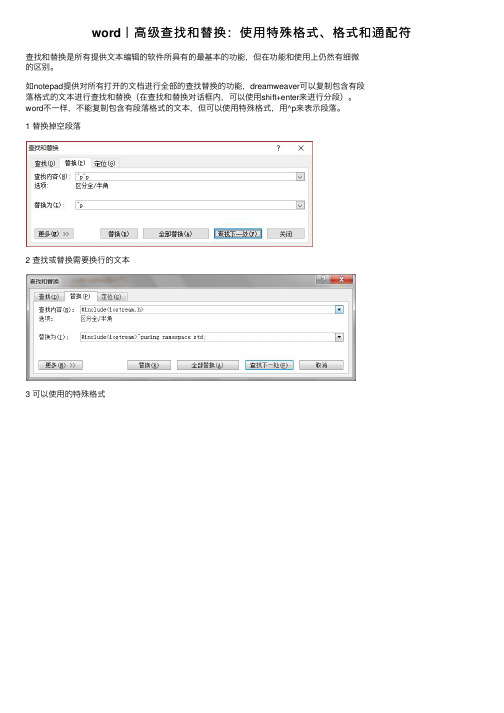
word|⾼级查找和替换:使⽤特殊格式、格式和通配符查找和替换是所有提供⽂本编辑的软件所具有的最基本的功能,但在功能和使⽤上仍然有细微的区别。
如notepad提供对所有打开的⽂档进⾏全部的查找替换的功能,dreamweaver可以复制包含有段落格式的⽂本进⾏查找和替换(在查找和替换对话框内,可以使⽤shift+enter来进⾏分段)。
word不⼀样,不能复制包含有段落格式的⽂本,但可以使⽤特殊格式,⽤^p来表⽰段落。
1 替换掉空段落2 查找或替换需要换⾏的⽂本3 可以使⽤的特殊格式4 按字符、段落等格式进⾏查找如要查找“红⾊、四号、加粗、宋体的⽂本:可以看到查找对话框中的格式:当进⾏常规查找(不考虑字符格式)时,需要单击”不限定格式“。
5 使⽤通配符使⽤通配符查找在输⼊查找内容时,可以使⽤问号(?)和星号(*)作为通配符,只需在搜索选项中勾选”使⽤通配符“即可。
如果查找问号(?)和星号(*)则在其字符前加上波浪号(~)。
* 表⽰零个到多个字符。
例如,s*d 可查找―sad和―started。
? 表⽰任意单个字符,涵盖任意字母.。
例如,s?t 可查找―sat和―set。
< 单词开头。
例如,<(inter) 查找―interesting和―intercept,但不查找―splintered。
> 单词结尾。
例如,(in)> 查找―in和―within,但不查找―interesting。
[ ] 指定字符之⼀。
例如,w[io]n 查找―win和―won。
[-] 指定范围内任意单个字符。
例如,[r-t]ight 查找―right和―sight。
必须⽤升序来表⽰该范围。
再如[a-z]和[A-Z]表⽰所有英⽂字符,必须⽤升序来表⽰该范围。
[0-9]表⽰所有数字字符。
[!x-z] 中括号内指定字符范围以外的任意单个字符。
例如,t[!a-m]ck 查找―tock和―tuck,但不查找―tack和―tick。
Word技巧高级搜索和替换功能
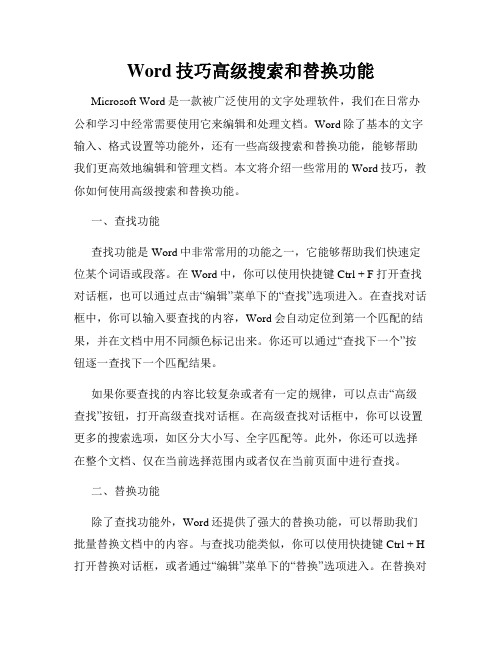
Word技巧高级搜索和替换功能Microsoft Word是一款被广泛使用的文字处理软件,我们在日常办公和学习中经常需要使用它来编辑和处理文档。
Word除了基本的文字输入、格式设置等功能外,还有一些高级搜索和替换功能,能够帮助我们更高效地编辑和管理文档。
本文将介绍一些常用的Word技巧,教你如何使用高级搜索和替换功能。
一、查找功能查找功能是Word中非常常用的功能之一,它能够帮助我们快速定位某个词语或段落。
在Word中,你可以使用快捷键Ctrl + F打开查找对话框,也可以通过点击“编辑”菜单下的“查找”选项进入。
在查找对话框中,你可以输入要查找的内容,Word会自动定位到第一个匹配的结果,并在文档中用不同颜色标记出来。
你还可以通过“查找下一个”按钮逐一查找下一个匹配结果。
如果你要查找的内容比较复杂或者有一定的规律,可以点击“高级查找”按钮,打开高级查找对话框。
在高级查找对话框中,你可以设置更多的搜索选项,如区分大小写、全字匹配等。
此外,你还可以选择在整个文档、仅在当前选择范围内或者仅在当前页面中进行查找。
二、替换功能除了查找功能外,Word还提供了强大的替换功能,可以帮助我们批量替换文档中的内容。
与查找功能类似,你可以使用快捷键Ctrl + H 打开替换对话框,或者通过“编辑”菜单下的“替换”选项进入。
在替换对话框中,你可以输入要查找和替换的内容,点击“全部替换”按钮后,Word会自动替换文档中所有匹配的内容。
在替换对话框中,你可以选择仅替换第一个匹配结果、逐一替换每个匹配结果,或者将所有匹配结果替换为指定的内容。
类似于高级查找,你还可以设置更多的替换选项,如区分大小写、全字匹配等。
三、使用通配符进行搜索替换Word还支持使用通配符进行更复杂的搜索和替换操作。
通配符是一种特殊的符号,可以代替一个或多个字符。
例如,你可以使用问号?代表一个任意字符,使用星号*代表零个或多个任意字符。
在进行通配符搜索替换时,你需要在替换对话框中勾选“使用通配符”选项。
如何在WORD中实现高级搜索和替换功能
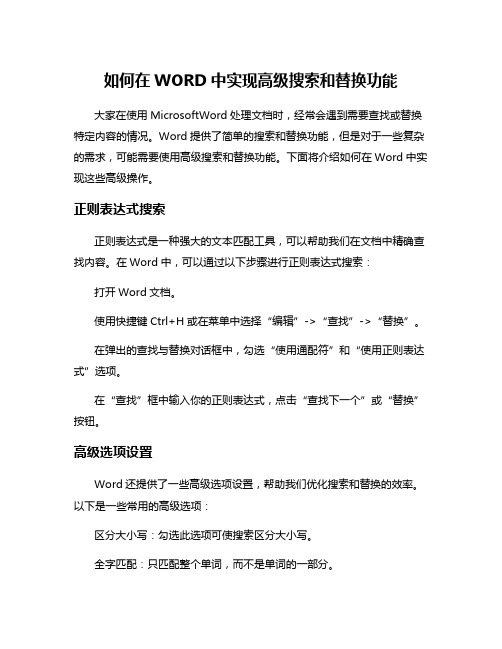
如何在WORD中实现高级搜索和替换功能大家在使用MicrosoftWord处理文档时,经常会遇到需要查找或替换特定内容的情况。
Word提供了简单的搜索和替换功能,但是对于一些复杂的需求,可能需要使用高级搜索和替换功能。
下面将介绍如何在Word中实现这些高级操作。
正则表达式搜索正则表达式是一种强大的文本匹配工具,可以帮助我们在文档中精确查找内容。
在Word中,可以通过以下步骤进行正则表达式搜索:打开Word文档。
使用快捷键Ctrl+H或在菜单中选择“编辑”->“查找”->“替换”。
在弹出的查找与替换对话框中,勾选“使用通配符”和“使用正则表达式”选项。
在“查找”框中输入你的正则表达式,点击“查找下一个”或“替换”按钮。
高级选项设置Word还提供了一些高级选项设置,帮助我们优化搜索和替换的效率。
以下是一些常用的高级选项:区分大小写:勾选此选项可使搜索区分大小写。
全字匹配:只匹配整个单词,而不是单词的一部分。
通配符:可以使用*代表零个或多个字符,?代表一个字符。
格式:可以根据字体、样式、段落格式等进行搜索。
批量替换有时候我们需要批量替换文档中的某个内容,Word也提供了批量替换功能:在“查找”框中输入要查找的内容。
在“替换”框中输入要替换成的内容。
点击“全部替换”按钮即可一次性替换全部匹配内容。
自定义搜索范围如果你只想在文档的特定范围内进行搜索,可以使用“选定范围”选项。
选中要搜索的内容,然后进行搜索操作,即可限定搜索范围。
通过本文介绍的高级搜索和替换功能,你可以更高效地在Word文档中查找和替换内容。
利用正则表达式、高级选项设置以及批量替换功能,可以让你轻松应对各种复杂的搜索需求。
在处理大量文本时,灵活运用这些功能,将会极大提升你的工作效率。
熟练掌握Word中的高级搜索和替换功能,有助于提升文档处理效率,快速准确地完成各种编辑任务。
使用Word进行批量搜索和替换的高级方法
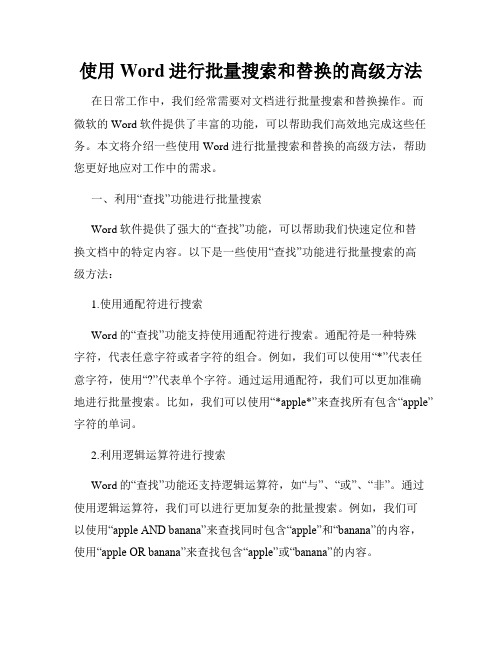
使用Word进行批量搜索和替换的高级方法在日常工作中,我们经常需要对文档进行批量搜索和替换操作。
而微软的Word软件提供了丰富的功能,可以帮助我们高效地完成这些任务。
本文将介绍一些使用Word进行批量搜索和替换的高级方法,帮助您更好地应对工作中的需求。
一、利用“查找”功能进行批量搜索Word软件提供了强大的“查找”功能,可以帮助我们快速定位和替换文档中的特定内容。
以下是一些使用“查找”功能进行批量搜索的高级方法:1.使用通配符进行搜索Word的“查找”功能支持使用通配符进行搜索。
通配符是一种特殊字符,代表任意字符或者字符的组合。
例如,我们可以使用“*”代表任意字符,使用“?”代表单个字符。
通过运用通配符,我们可以更加准确地进行批量搜索。
比如,我们可以使用“*apple*”来查找所有包含“apple”字符的单词。
2.利用逻辑运算符进行搜索Word的“查找”功能还支持逻辑运算符,如“与”、“或”、“非”。
通过使用逻辑运算符,我们可以进行更加复杂的批量搜索。
例如,我们可以使用“apple AND banana”来查找同时包含“apple”和“banana”的内容,使用“apple OR banana”来查找包含“apple”或“banana”的内容。
3.利用格式设置进行搜索Word的“查找”功能还支持根据格式进行搜索。
比如,我们可以在“查找”窗口中选择“格式”按钮,然后选择“字体”、“段落”、“样式”等选项,根据特定的格式要求来进行批量搜索。
这对于处理复杂的文档格式非常有帮助。
二、利用“替换”功能进行批量替换除了支持批量搜索外,Word还提供了“替换”功能,可以帮助我们快速替换文档中的内容。
以下是一些使用“替换”功能进行批量替换的高级方法:1.利用正则表达式进行替换Word的“替换”功能支持使用正则表达式进行替换。
正则表达式是一种强大的模式匹配工具,可以根据特定的规则替换文本内容。
例如,我们可以使用正则表达式“^apple”来替换文档中所有以“apple”开头的单词。
Word中的文本查找和替换高级技巧
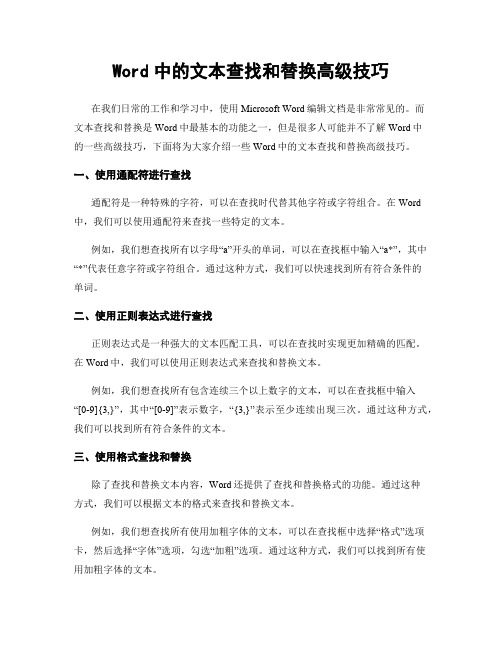
Word中的文本查找和替换高级技巧在我们日常的工作和学习中,使用Microsoft Word编辑文档是非常常见的。
而文本查找和替换是Word中最基本的功能之一,但是很多人可能并不了解Word中的一些高级技巧,下面将为大家介绍一些Word中的文本查找和替换高级技巧。
一、使用通配符进行查找通配符是一种特殊的字符,可以在查找时代替其他字符或字符组合。
在Word 中,我们可以使用通配符来查找一些特定的文本。
例如,我们想查找所有以字母“a”开头的单词,可以在查找框中输入“a*”,其中“*”代表任意字符或字符组合。
通过这种方式,我们可以快速找到所有符合条件的单词。
二、使用正则表达式进行查找正则表达式是一种强大的文本匹配工具,可以在查找时实现更加精确的匹配。
在Word中,我们可以使用正则表达式来查找和替换文本。
例如,我们想查找所有包含连续三个以上数字的文本,可以在查找框中输入“[0-9]{3,}”,其中“[0-9]”表示数字,“{3,}”表示至少连续出现三次。
通过这种方式,我们可以找到所有符合条件的文本。
三、使用格式查找和替换除了查找和替换文本内容,Word还提供了查找和替换格式的功能。
通过这种方式,我们可以根据文本的格式来查找和替换文本。
例如,我们想查找所有使用加粗字体的文本,可以在查找框中选择“格式”选项卡,然后选择“字体”选项,勾选“加粗”选项。
通过这种方式,我们可以找到所有使用加粗字体的文本。
四、使用通配符和格式结合进行查找和替换在Word中,我们还可以结合使用通配符和格式来进行更加复杂的查找和替换操作。
例如,我们想查找所有以字母“a”开头且使用加粗字体的文本,可以在查找框中输入“a*”,然后选择“格式”选项卡,选择“字体”选项,勾选“加粗”选项。
通过这种方式,我们可以找到所有符合条件的文本。
总结:通过上述介绍,我们可以看到,在Word中,文本查找和替换并不仅仅局限于简单的内容匹配,还可以通过使用通配符、正则表达式和格式等高级技巧来实现更加精确和复杂的操作。
【Word查找替换高级玩法】Word通配符各种查找替换命令实例
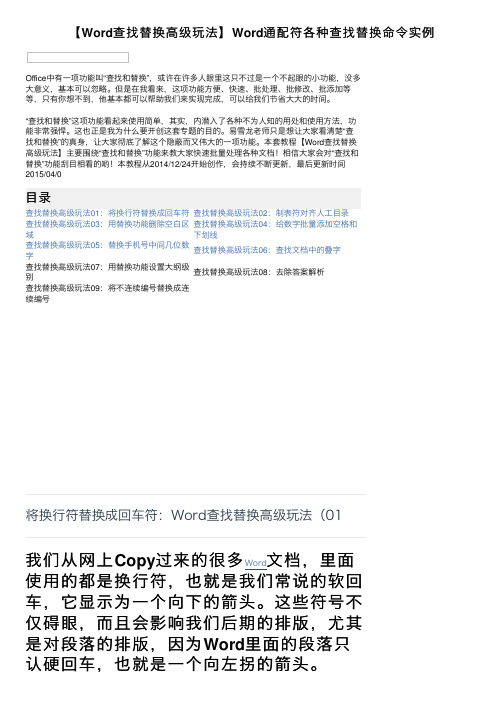
今天,易雪龙⽼师就来教⼤家批量去掉这些换⾏符,其实只需要⼀些查找替换的技巧就能轻松搞定啦!下⾯这就是今天的案例,我们要将⾥⾯的软回车全部替换成硬回车。
1、打开替换对话框。
我们可以切换到“开始”选项卡,在“编辑”组中执⾏“替换”命令。
也可以按下Ctrl+H快捷键。
2、此时会弹出⼀个“查找和替换”对话框,并且已经切换到了“替换”选项卡,我们在“查找内容”⽂本框中输⼊“^l”(代表换⾏符),然后在“替换为”右侧的⽂本框中输⼊“^p”(代表回车符),最后单击“全部替换”按钮。
替换完成后会弹出⼀个对话框,我们单击“确定”按钮即可。
3、好了,现在⽂档中的换⾏符已经按要求替换成了回车符,效果如下。
制表符对齐⼈⼯⽬录:Word查找替换⾼级玩法(02)⾃⼰在Word中输⼊⽬录的时候是不是总也对不齐最右边的页码?这就是⼈⼯制作⽬录的不⾜之处了,但因着它能让我们更⾃由的发挥,所以还是得到了⼀些⼈的偏爱。
那么问题来了,到底要怎么对齐这种⼈⼯⽬录呢?其实只要⼀点⼩⼩的替换技巧就能轻松搞定啦,易雪龙⽼师今天就以下图中的⽂档为例,给⼤家好好说道说道!更多《Word查找替换⾼级玩法》教程请点击1、将光标定位到⽂档的起始位置,切换到“开始”选项卡,然后在“编辑”组中单击“替换”按钮。
2、此时会弹出“查找和替换”对话框,并且已经切换到了“替换”选项卡,我们在“查找内容”右侧的⽂本框中输⼊“(…)@”,然后单击“更多>>”按钮。
在展开的“搜索选项”中将搜索内容设置为全部,并勾选“使⽤通配符”。
这样⼀来,查找的内容就是⾄少含有⼀个省略号的了。
3、在“替换为”右侧的⽂本框中输⼊“^t”(意思是制表符),然后单击“格式”中的“制表位”。
4、设置制表位。
在弹出的对话框中将制表位的对齐⽅式设置为“右对齐”,制表位位置和前导符⼤家可以根据⾃⼰的需要进⾏设置,完成之后单击“确定”按钮。
5、现在,查找和替换的内容都已经设置完成,单击“全部替换”按钮,系统会⾃动搜索出查找的内容并将其替换掉,完成之后会弹出全部完成对话框,我们单击“确定”按钮即可。
Word中的高级搜索和替换技巧
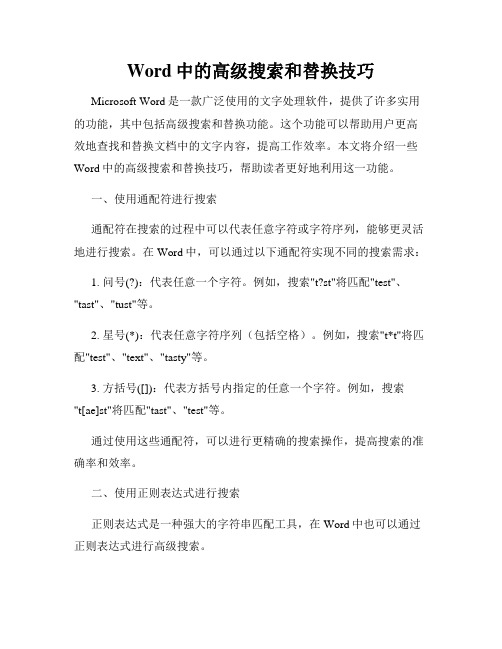
Word中的高级搜索和替换技巧Microsoft Word是一款广泛使用的文字处理软件,提供了许多实用的功能,其中包括高级搜索和替换功能。
这个功能可以帮助用户更高效地查找和替换文档中的文字内容,提高工作效率。
本文将介绍一些Word中的高级搜索和替换技巧,帮助读者更好地利用这一功能。
一、使用通配符进行搜索通配符在搜索的过程中可以代表任意字符或字符序列,能够更灵活地进行搜索。
在Word中,可以通过以下通配符实现不同的搜索需求:1. 问号(?):代表任意一个字符。
例如,搜索"t?st"将匹配"test"、"tast"、"tust"等。
2. 星号(*):代表任意字符序列(包括空格)。
例如,搜索"t*t"将匹配"test"、"text"、"tasty"等。
3. 方括号([]):代表方括号内指定的任意一个字符。
例如,搜索"t[ae]st"将匹配"tast"、"test"等。
通过使用这些通配符,可以进行更精确的搜索操作,提高搜索的准确率和效率。
二、使用正则表达式进行搜索正则表达式是一种强大的字符串匹配工具,在Word中也可以通过正则表达式进行高级搜索。
1. 启用正则表达式搜索:在进行搜索操作之前,需要在搜索框中启用正则表达式选项。
可以通过点击搜索框旁边的"查找选项"按钮,然后选择"使用通配符和正则表达式"来启用。
2. 使用正则表达式进行搜索:在启用正则表达式选项后,可以使用正则表达式来进行更复杂的搜索。
例如,"\b[A-Z]{2}\b"将匹配两个连续大写字母组成的单词。
通过使用正则表达式,可以实现更灵活、更精确的搜索。
三、批量替换文档中的文字Word中的批量替换功能可以帮助用户快速替换文档中的文字内容,提高替换效率。
WORD高级查找和替换及通配符的使用
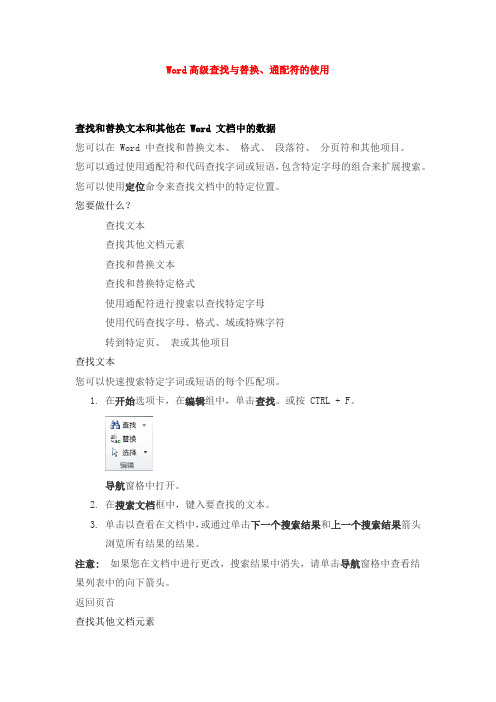
Word高级查找与替换、通配符的使用查找和替换文本和其他在 Word 文档中的数据您可以在 Word 中查找和替换文本、格式、段落符、分页符和其他项目。
您可以通过使用通配符和代码查找字词或短语,包含特定字母的组合来扩展搜索。
您可以使用定位命令来查找文档中的特定位置。
您要做什么?查找文本查找其他文档元素查找和替换文本查找和替换特定格式使用通配符进行搜索以查找特定字母使用代码查找字母、格式、域或特殊字符转到特定页、表或其他项目查找文本您可以快速搜索特定字词或短语的每个匹配项。
1.在开始选项卡,在编辑组中,单击查找。
或按 CTRL + F。
导航窗格中打开。
2.在搜索文档框中,键入要查找的文本。
3.单击以查看在文档中,或通过单击下一个搜索结果和上一个搜索结果箭头浏览所有结果的结果。
注意:如果您在文档中进行更改,搜索结果中消失,请单击导航窗格中查看结果列表中的向下箭头。
返回页首查找其他文档元素若要搜索的表、图形、批注、脚注或尾注或公式,请执行以下操作︰1.在开始选项卡,在编辑组中,单击查找。
或按 CTRL + F。
导航窗格中打开。
2.单击放大镜,旁边的箭头,然后单击所需的选项。
3.单击以查看在文档中,或通过单击下一个搜索结果和上一个搜索结果箭头浏览所有结果的结果。
返回页首更多搜索选项若要查找旧查找对话框中,和所有其选项,请执行下列操作之一︰∙在“开始”选项卡上的“编辑”组中,单击“查找”旁边的箭头,然后单击“高级查找”。
∙在导航窗格中,单击放大镜,旁边的箭头,然后单击高级查找。
注意:如果您只需一个基本的选项,如区分大小写,在导航窗格中,单击放大镜,旁边的箭头,然后单击选项。
查找和替换文本1.在“开始”选项卡的“编辑”组中,单击“替换”。
2.在查找内容框中,键入您想要搜索和替换的文本。
3.在“替换为”框中,键入替换文本。
4.查找下一步,单击,然后执行下列操作之一︰o若要替换突出显示的文本,请单击替换。
o要替换的文档中的文本的所有实例,请单击全部都替换。
Word技巧高级搜索和替换功能
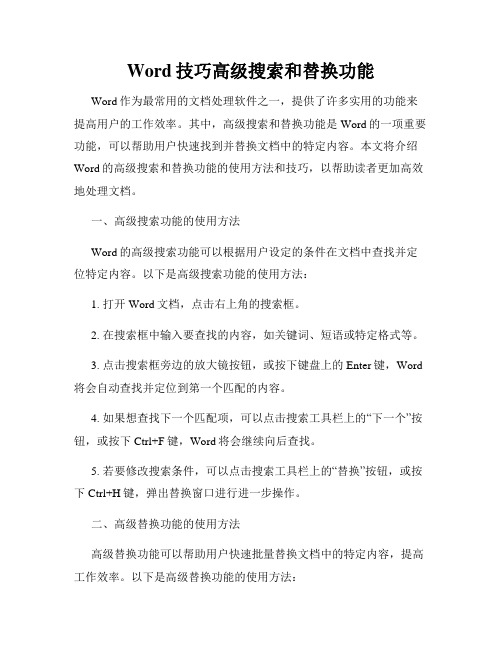
Word技巧高级搜索和替换功能Word作为最常用的文档处理软件之一,提供了许多实用的功能来提高用户的工作效率。
其中,高级搜索和替换功能是Word的一项重要功能,可以帮助用户快速找到并替换文档中的特定内容。
本文将介绍Word的高级搜索和替换功能的使用方法和技巧,以帮助读者更加高效地处理文档。
一、高级搜索功能的使用方法Word的高级搜索功能可以根据用户设定的条件在文档中查找并定位特定内容。
以下是高级搜索功能的使用方法:1. 打开Word文档,点击右上角的搜索框。
2. 在搜索框中输入要查找的内容,如关键词、短语或特定格式等。
3. 点击搜索框旁边的放大镜按钮,或按下键盘上的Enter键,Word 将会自动查找并定位到第一个匹配的内容。
4. 如果想查找下一个匹配项,可以点击搜索工具栏上的“下一个”按钮,或按下Ctrl+F键,Word将会继续向后查找。
5. 若要修改搜索条件,可以点击搜索工具栏上的“替换”按钮,或按下Ctrl+H键,弹出替换窗口进行进一步操作。
二、高级替换功能的使用方法高级替换功能可以帮助用户快速批量替换文档中的特定内容,提高工作效率。
以下是高级替换功能的使用方法:1. 打开Word文档,点击Word工具栏上的“替换”按钮,或按下Ctrl+H键,弹出替换窗口。
2. 在“查找内容”框中输入要查找的内容,如关键词、短语或特定格式等。
3. 在“替换为”框中输入要替换成的内容。
4. 点击替换窗口下方的“全部替换”按钮,Word将会自动查找并替换所有匹配项。
5. 如果要逐个确认替换,可以点击“查找下一个”按钮,逐个确认替换。
三、高级搜索和替换的技巧除了基本的使用方法外,以下是一些高级搜索和替换的技巧,可以帮助用户更加灵活地利用这两个功能:1. 使用通配符:通过使用通配符,可以更精确地查找和替换特定内容。
通配符包括“*”和“?”符号,其中“*”表示任意长度的字符,而“?”表示任意单个字符。
2. 利用特殊字符:在搜索和替换中,可以使用特殊字符进行更加精确的匹配。
利用Word的搜索和替换高级选项进行文本编辑
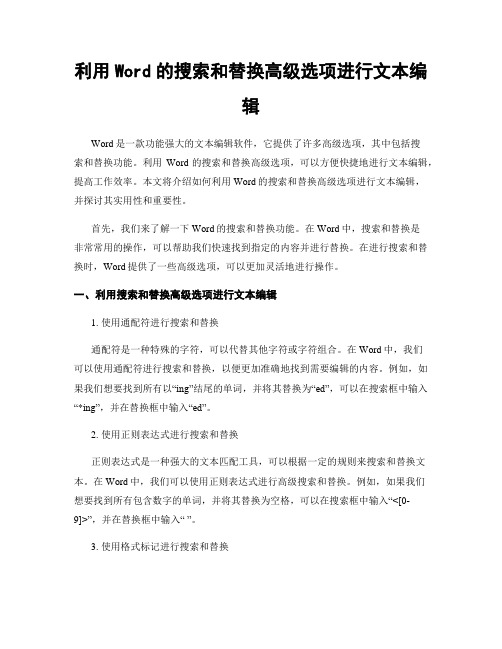
利用Word的搜索和替换高级选项进行文本编辑Word是一款功能强大的文本编辑软件,它提供了许多高级选项,其中包括搜索和替换功能。
利用Word的搜索和替换高级选项,可以方便快捷地进行文本编辑,提高工作效率。
本文将介绍如何利用Word的搜索和替换高级选项进行文本编辑,并探讨其实用性和重要性。
首先,我们来了解一下Word的搜索和替换功能。
在Word中,搜索和替换是非常常用的操作,可以帮助我们快速找到指定的内容并进行替换。
在进行搜索和替换时,Word提供了一些高级选项,可以更加灵活地进行操作。
一、利用搜索和替换高级选项进行文本编辑1. 使用通配符进行搜索和替换通配符是一种特殊的字符,可以代替其他字符或字符组合。
在Word中,我们可以使用通配符进行搜索和替换,以便更加准确地找到需要编辑的内容。
例如,如果我们想要找到所有以“ing”结尾的单词,并将其替换为“ed”,可以在搜索框中输入“*ing”,并在替换框中输入“ed”。
2. 使用正则表达式进行搜索和替换正则表达式是一种强大的文本匹配工具,可以根据一定的规则来搜索和替换文本。
在Word中,我们可以使用正则表达式进行高级搜索和替换。
例如,如果我们想要找到所有包含数字的单词,并将其替换为空格,可以在搜索框中输入“<[0-9]>”,并在替换框中输入“ ”。
3. 使用格式标记进行搜索和替换在Word中,我们可以使用格式标记进行搜索和替换。
格式标记是一种特殊的字符,用于表示文本中的格式信息。
例如,我们可以使用格式标记找到所有加粗的文本,并将其替换为斜体。
在搜索框中,我们可以输入“^b”来表示加粗文本,在替换框中输入“^i”来表示斜体。
二、搜索和替换高级选项的实用性和重要性搜索和替换是我们在日常工作中经常进行的操作,而利用Word的搜索和替换高级选项可以使这一过程更加高效和准确。
通过使用通配符、正则表达式和格式标记等高级选项,我们可以更加灵活地进行搜索和替换,满足不同的编辑需求。
Word高级查找、通配符查找、替换
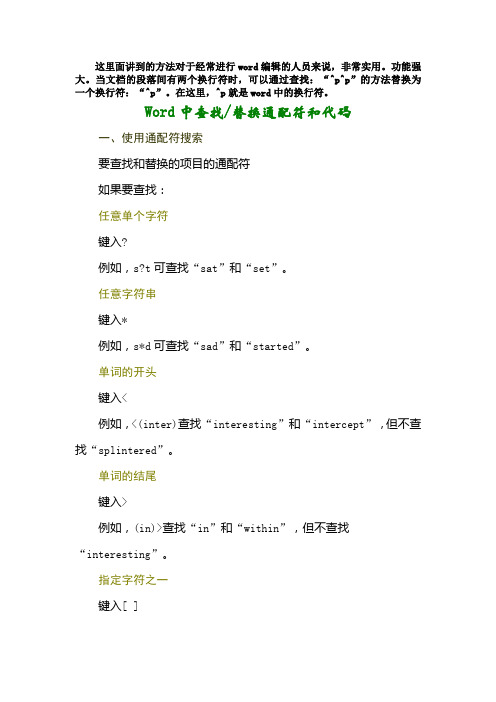
这里面讲到的方法对于经常进行word编辑的人员来说,非常实用。
功能强大。
当文档的段落间有两个换行符时,可以通过查找:“^p^p”的方法替换为一个换行符:“^p”。
在这里,^p就是word中的换行符。
Word中查找/替换通配符和代码一、使用通配符搜索要查找和替换的项目的通配符如果要查找:任意单个字符键入?例如,s?t可查找“sat”和“set”。
任意字符串键入*例如,s*d可查找“sad”和“started”。
单词的开头键入<例如,<(inter)查找“interesting”和“intercept”,但不查找“splintered”。
单词的结尾键入>例如,(in)>查找“in”和“within”,但不查找“interesting”。
指定字符之一键入[ ]例如,w[io]n查找“win”和“won”。
指定范围内任意单个字符键入[-]例如,[r-t]ight查找“right”和“sight”。
必须用升序来表示该范围。
中括号内指定字符范围以外的任意单个字符键入[!x-z]例如,t[!a-m]ck查找“tock”和“tuck”,但不查找“tack”和“tick”。
n个重复的前一字符或表达式键入{n}例如,fe{2}d查找“feed”,但不查找“fed”。
至少n个前一字符或表达式键入{n,}例如,fe{1,}d查找“fed”和“feed”。
n到m个前一字符或表达式键入{n,m}例如,10{1,3}查找“10”、“100”和“1000”。
一个以上的前一字符或表达式键入@例如,lo@t查找“lot”和“loot”。
注释可使用括号对通配符和文字进行分组,以指明处理次序,例如,可以通过键入“<(pre)*(ed)>”来查找“presorted”和“prevented”。
可使用\n通配符搜索表达式,然后将其替换为经过重新排列的表达式。
例如,在“查找内容”框键入“(Newton)(Christie)”,在“替换为”框键入“\2\1”,Word 将找到“Newton Christie”并将其替换为“Christie Newton”。
Word中的查找与替换高级用法分享
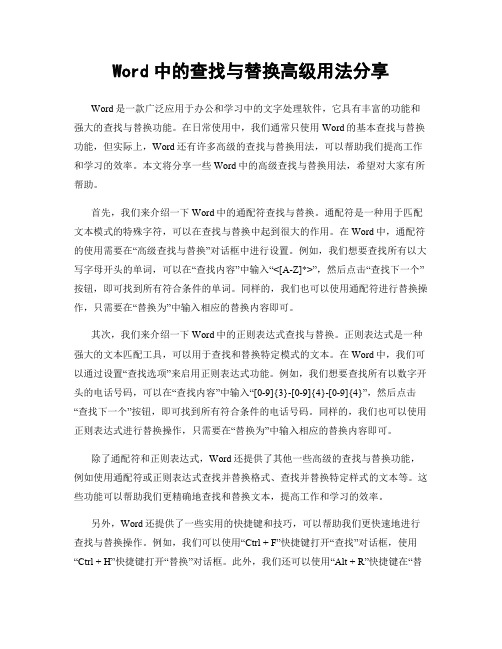
Word中的查找与替换高级用法分享Word是一款广泛应用于办公和学习中的文字处理软件,它具有丰富的功能和强大的查找与替换功能。
在日常使用中,我们通常只使用Word的基本查找与替换功能,但实际上,Word还有许多高级的查找与替换用法,可以帮助我们提高工作和学习的效率。
本文将分享一些Word中的高级查找与替换用法,希望对大家有所帮助。
首先,我们来介绍一下Word中的通配符查找与替换。
通配符是一种用于匹配文本模式的特殊字符,可以在查找与替换中起到很大的作用。
在Word中,通配符的使用需要在“高级查找与替换”对话框中进行设置。
例如,我们想要查找所有以大写字母开头的单词,可以在“查找内容”中输入“<[A-Z]*>”,然后点击“查找下一个”按钮,即可找到所有符合条件的单词。
同样的,我们也可以使用通配符进行替换操作,只需要在“替换为”中输入相应的替换内容即可。
其次,我们来介绍一下Word中的正则表达式查找与替换。
正则表达式是一种强大的文本匹配工具,可以用于查找和替换特定模式的文本。
在Word中,我们可以通过设置“查找选项”来启用正则表达式功能。
例如,我们想要查找所有以数字开头的电话号码,可以在“查找内容”中输入“[0-9]{3}-[0-9]{4}-[0-9]{4}”,然后点击“查找下一个”按钮,即可找到所有符合条件的电话号码。
同样的,我们也可以使用正则表达式进行替换操作,只需要在“替换为”中输入相应的替换内容即可。
除了通配符和正则表达式,Word还提供了其他一些高级的查找与替换功能,例如使用通配符或正则表达式查找并替换格式、查找并替换特定样式的文本等。
这些功能可以帮助我们更精确地查找和替换文本,提高工作和学习的效率。
另外,Word还提供了一些实用的快捷键和技巧,可以帮助我们更快速地进行查找与替换操作。
例如,我们可以使用“Ctrl + F”快捷键打开“查找”对话框,使用“Ctrl + H”快捷键打开“替换”对话框。
Word技巧高级搜索和替换功能
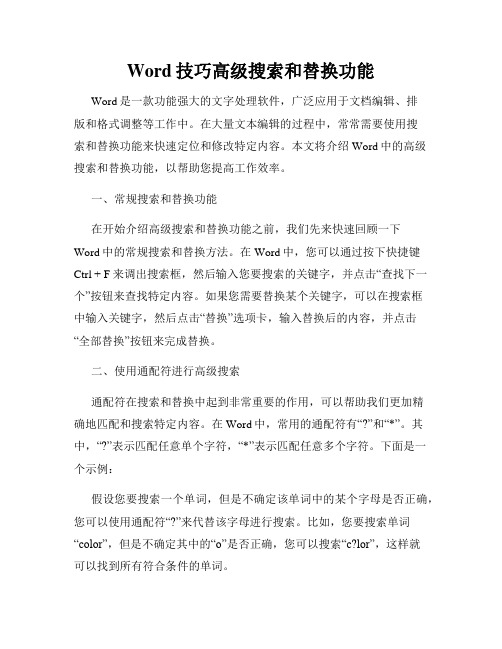
Word技巧高级搜索和替换功能Word是一款功能强大的文字处理软件,广泛应用于文档编辑、排版和格式调整等工作中。
在大量文本编辑的过程中,常常需要使用搜索和替换功能来快速定位和修改特定内容。
本文将介绍Word中的高级搜索和替换功能,以帮助您提高工作效率。
一、常规搜索和替换功能在开始介绍高级搜索和替换功能之前,我们先来快速回顾一下Word中的常规搜索和替换方法。
在Word中,您可以通过按下快捷键Ctrl + F来调出搜索框,然后输入您要搜索的关键字,并点击“查找下一个”按钮来查找特定内容。
如果您需要替换某个关键字,可以在搜索框中输入关键字,然后点击“替换”选项卡,输入替换后的内容,并点击“全部替换”按钮来完成替换。
二、使用通配符进行高级搜索通配符在搜索和替换中起到非常重要的作用,可以帮助我们更加精确地匹配和搜索特定内容。
在Word中,常用的通配符有“?”和“*”。
其中,“?”表示匹配任意单个字符,“*”表示匹配任意多个字符。
下面是一个示例:假设您要搜索一个单词,但是不确定该单词中的某个字母是否正确,您可以使用通配符“?”来代替该字母进行搜索。
比如,您要搜索单词“color”,但是不确定其中的“o”是否正确,您可以搜索“c?lor”,这样就可以找到所有符合条件的单词。
同样地,如果您要搜索一段文字,但是不知道其中的某个词或者某个字母是什么,您可以使用通配符“*”来代替进行搜索。
比如,您要搜索一句话中的某个成语,但是不知道其中的某个字是什么,您可以搜索“*成语*”,这样就可以找到所有符合条件的内容。
三、使用格式选项进行高级搜索除了通配符,Word还提供了丰富的格式选项,可以帮助我们在搜索和替换时更加精确地匹配特定样式的内容。
在搜索框中,点击“格式”按钮,就可以看到多个格式选项,包括字体、段落、样式等。
例如,如果您要搜索一个特定字体的文字,可以选择“字体”选项,并选中您要搜索的字体。
同样地,如果您要搜索特定格式的段落,可以选择“段落”选项,并选中相应的格式。
如何在Word中使用查找和替换的高级选项
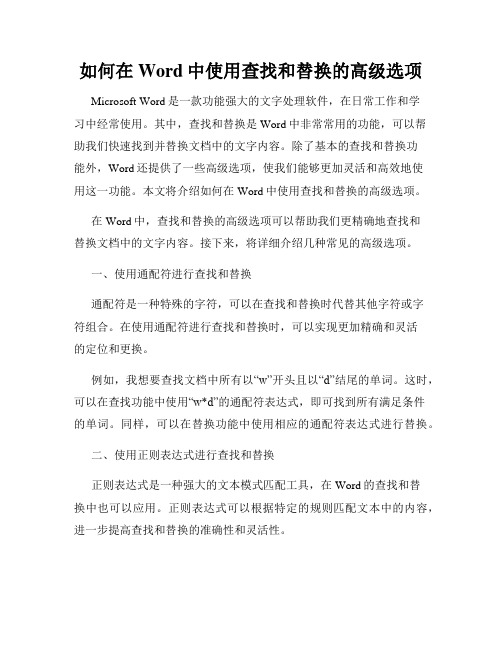
如何在Word中使用查找和替换的高级选项Microsoft Word是一款功能强大的文字处理软件,在日常工作和学习中经常使用。
其中,查找和替换是Word中非常常用的功能,可以帮助我们快速找到并替换文档中的文字内容。
除了基本的查找和替换功能外,Word还提供了一些高级选项,使我们能够更加灵活和高效地使用这一功能。
本文将介绍如何在Word中使用查找和替换的高级选项。
在Word中,查找和替换的高级选项可以帮助我们更精确地查找和替换文档中的文字内容。
接下来,将详细介绍几种常见的高级选项。
一、使用通配符进行查找和替换通配符是一种特殊的字符,可以在查找和替换时代替其他字符或字符组合。
在使用通配符进行查找和替换时,可以实现更加精确和灵活的定位和更换。
例如,我想要查找文档中所有以“w”开头且以“d”结尾的单词。
这时,可以在查找功能中使用“w*d”的通配符表达式,即可找到所有满足条件的单词。
同样,可以在替换功能中使用相应的通配符表达式进行替换。
二、使用正则表达式进行查找和替换正则表达式是一种强大的文本模式匹配工具,在Word的查找和替换中也可以应用。
正则表达式可以根据特定的规则匹配文本中的内容,进一步提高查找和替换的准确性和灵活性。
例如,我想要查找文档中所有包含连续三个及以上相同字母的单词。
这时,可以在查找功能中使用正则表达式“([a-z])\1\1+”进行查找。
同样,可以在替换功能中使用相应的正则表达式进行替换。
三、使用格式选项进行查找和替换Word中的格式选项可以帮助我们根据文字、段落、样式等特定的格式进行查找和替换。
这对于处理复杂的文档和特定格式要求的文档非常有用。
例如,我想要查找文档中所有使用斜体字体的文本。
这时,可以在查找功能中选择“格式”选项,然后选择“字体”选项卡,选择“斜体”字体,即可查找到所有使用斜体字体的内容。
同样,可以在替换功能中使用相应的格式选项进行替换。
四、使用特殊选项进行查找和替换除了通配符、正则表达式和格式选项,Word还提供了其他一些特殊选项,可以进一步扩展和精确查找和替换的范围。
Word查找和替换技巧精确搜索文本
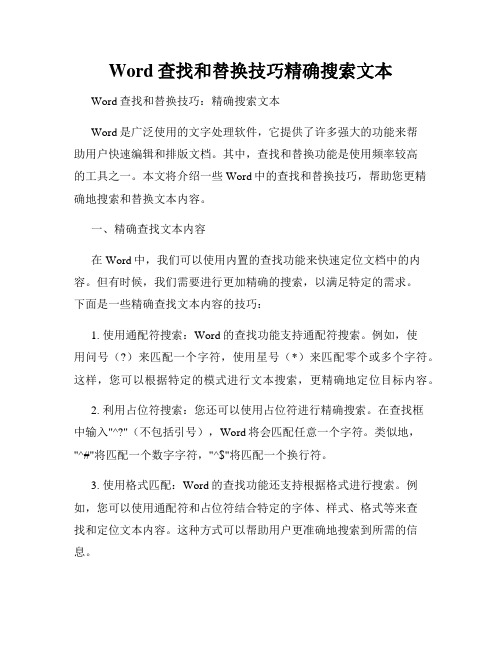
Word查找和替换技巧精确搜索文本Word查找和替换技巧:精确搜索文本Word是广泛使用的文字处理软件,它提供了许多强大的功能来帮助用户快速编辑和排版文档。
其中,查找和替换功能是使用频率较高的工具之一。
本文将介绍一些Word中的查找和替换技巧,帮助您更精确地搜索和替换文本内容。
一、精确查找文本内容在Word中,我们可以使用内置的查找功能来快速定位文档中的内容。
但有时候,我们需要进行更加精确的搜索,以满足特定的需求。
下面是一些精确查找文本内容的技巧:1. 使用通配符搜索:Word的查找功能支持通配符搜索。
例如,使用问号(?)来匹配一个字符,使用星号(*)来匹配零个或多个字符。
这样,您可以根据特定的模式进行文本搜索,更精确地定位目标内容。
2. 利用占位符搜索:您还可以使用占位符进行精确搜索。
在查找框中输入"^?"(不包括引号),Word将会匹配任意一个字符。
类似地,"^#"将匹配一个数字字符,"^$"将匹配一个换行符。
3. 使用格式匹配:Word的查找功能还支持根据格式进行搜索。
例如,您可以使用通配符和占位符结合特定的字体、样式、格式等来查找和定位文本内容。
这种方式可以帮助用户更准确地搜索到所需的信息。
二、精确替换文本内容替换文本内容是Word中的另一个常用操作。
通过替换功能,我们可以快速将文档中的特定文本改为另一段文字。
下面是一些精确替换文本内容的技巧:1. 使用查找并替换:除了基本的查找功能外,Word还提供了查找并替换的功能。
在查找框中输入要查找的内容,在替换框中输入要替换成的内容,然后点击替换按钮或全部替换按钮即可。
此功能可以帮助用户快速替换文档中的多个片段。
2. 使用格式替换:与查找功能类似,替换功能也支持根据特定的格式进行替换。
例如,您可以只将特定字体、样式或格式的文本替换为其他内容,而不影响文档中其他部分的格式。
3. 利用批量替换:如果需要一次性替换多个不同的文本内容,Word 的批量替换功能将非常有用。
Word中如何使用通配符进行查找和替换
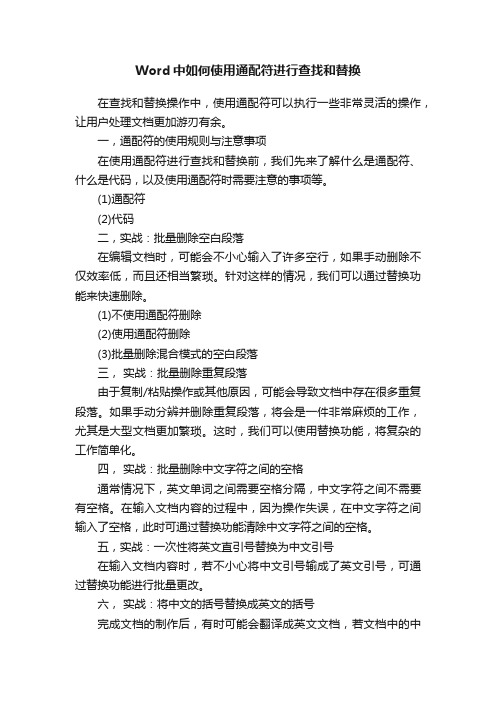
Word中如何使用通配符进行查找和替换在查找和替换操作中,使用通配符可以执行一些非常灵活的操作,让用户处理文档更加游刃有余。
一,通配符的使用规则与注意事项在使用通配符进行查找和替换前,我们先来了解什么是通配符、什么是代码,以及使用通配符时需要注意的事项等。
(1)通配符(2)代码二,实战:批量删除空白段落在编辑文档时,可能会不小心输入了许多空行,如果手动删除不仅效率低,而且还相当繁琐。
针对这样的情况,我们可以通过替换功能来快速删除。
(1)不使用通配符删除(2)使用通配符删除(3)批量删除混合模式的空白段落三,实战:批量删除重复段落由于复制/粘贴操作或其他原因,可能会导致文档中存在很多重复段落。
如果手动分辨并删除重复段落,将会是一件非常麻烦的工作,尤其是大型文档更加繁琐。
这时,我们可以使用替换功能,将复杂的工作简单化。
四,实战:批量删除中文字符之间的空格通常情况下,英文单词之间需要空格分隔,中文字符之间不需要有空格。
在输入文档内容的过程中,因为操作失误,在中文字符之间输入了空格,此时可通过替换功能清除中文字符之间的空格。
五,实战:一次性将英文直引号替换为中文引号在输入文档内容时,若不小心将中文引号输成了英文引号,可通过替换功能进行批量更改。
六,实战:将中文的括号替换成英文的括号完成文档的制作后,有时可能会翻译成英文文档,若文档中的中文括号过多,逐个手动修改成英文括号,非常费时费力,此时可以通过替换功能高效完成修改。
七,实战:批量在单元格中添加指定的符号完成表格的编辑后,有时候可能需要为表格中的内容添加统一的符号,例如要为表示金额的数字添加货币符号,此时,可通过替换功能批量完成。
八,实战:在表格中两个字的姓名中间批量添加全角空格编辑表格时,为了使表格更加美观,有时需要在表格中所有两个字的姓名中间批量添加一个全角空格,使之与三个字的姓名对齐。
九,实战:批量删除所有以英文字母开头的段落在中英文字分行显示的中英双语文档中,如果希望删除所有英文段落只保留中文段落,则可以通过替换功能快速实现。
- 1、下载文档前请自行甄别文档内容的完整性,平台不提供额外的编辑、内容补充、找答案等附加服务。
- 2、"仅部分预览"的文档,不可在线预览部分如存在完整性等问题,可反馈申请退款(可完整预览的文档不适用该条件!)。
- 3、如文档侵犯您的权益,请联系客服反馈,我们会尽快为您处理(人工客服工作时间:9:00-18:30)。
Find and Replace using wildcardsThis tutorial pre-supposes that the user will have somebasic experience of Word's 'replace' function.The secret of using wildcard searches is to identify theunique string of text that you wish to find. Wildcards arecombined with regular text and formatting options torepresent the characters or sequences of characters inthat string. Because different combinations of characterscan be represented by a variety of wildcard combinations,there is often more than one way of identifying a particularstring of text within a document. How you choose torepresent that group of characters is therefore a matter ofindividual preference; and the context of the text within thedocument will to a great extent dictate the most suitablecombination to use on a particular occasion.Start by identifying the string you wish to replace and thenpop up the replace function (CTRL+H) or select AdvancedFind from the Editing group on the Home tab of theribbon (see below); or in earlier Word versions Edit >Replace.Click the 'More' button to present the additional functions and check the 'Use wildcards' option:Insert your find and replace strings using the following guide for inspiration.You can paste any (Unicode) character - unfortunately*not* characters from decorative (Symbol) fonts) - into your search expressions. So copying the first and last characters from the Greek or cyrillic subsets into a search:[;-ώ] would match any Greek character α β γ δ ε...<[Ё-ґ]@> matches any cyrillic word: Вы можете помочь мне?(“Can you help me please?”)In Word 2000, you can type in Unicode characters with the Alt-key (make sure NumLock is on, then hold down the Alt-key and type the numbers on the numeric keyboard). Since all characters from decorative fonts (Symbol-, Wingdings-fonts ...) are kept in a special code page from &HF000 to &HF0FF, you can search for them with[Alt61472-Alt61695].Gotchas <![endif]>.You may wish to identify a character string by means of aparagraph mark ¶. The normal search string for this wouldbe ^p.^p DOES NOT WORK in wildcard search strings! It musthowever be used in replacement strings, but whensearching, you must look for the substitute code ^13.Wildcard searches will also not find footnote/endnotemarks - substitute ^2.A-z would be expected to reproduce all the letters betweenA and z i.e. both upper case and lower case letters, whichit does, but it reproduces all the characters from ASCII 65to ASCII 122, and that block also includes the characters [ ]` ^ _ / Use A-Za-z instead.The question mark ? is used to find individual characters.If used with curly brackets to define a range of characterseg#?{1,3}# it will behave as an asterisk and find all thecharacters between the hash symbols.Control Codes that may be used with the search/replace tool/?kbid=197855Graphic (In Line Graphics Only). In Word 2007 a forward slash / also appears to find in-line graphics. This appears to be an unintentional bug.New line -Tab -Paragraph Mark -There are many occasions when you are presented with blocks of text or numbers etc., where the order of the textis not what you might require in the final document. Swapping the placement of forename and surname as above is one such example - and don't forget you can add to the replacement, even when using bracketed replacementse.g. you may wish John Smith to appear as Smith, John or, more likely, you may have a column of names in a table, where you wish to exchange all the surnames with all the forenames.You could do them one at a time, but by replacing the names with wildcards, you can do the lot in one pass.Let's then break up the names into logical sequences that can only represent the names.At its simplest, we have here two words - John and Smith.They can be represented by <*>[space]<*> - where[space] is a single press of the spacebar.Add the round brackets (<*>)[space](<*>) and replacewith \2[space]\1Run the search on the column of names and all areswapped. Run it again and they are swapped back.Example 2This could be the changing of UK format dates to USformat dates - or vice versa.7th August 2001 to August 7th, 2001To give an example of how most of the wildcards could beused in one search sequence to find any UK dateformatted above to its equivalent US format date, thefollowing search pattern will do the trick:[0-9]{1,2}[dhnrst]{2} <[AFJMNSOD]*>[0-9]{4}Breaking it down [0-9] looks for any single digit number,but dates can have two numbers so to restrict that to two,we use the count function. We want to find dates with 1 or2 numbers so[0-9]{1,2}Next bit is the ordinal 'th'- Ordinals will be 'st' 'rd' or 'th' so identify those lettersspecifically:[dhnrst]There will always be two letters, so restrict the count to 2[dhnrst]{2}Next comes the space. You can insert a space [space]The month always begins with one of the following capitalletters - AFJMNSOD. We don't know how many letters thismonth has so we can use the blanket '*' to represent therest. And we are only interested in that word so we will tieit down with <> brackets.<[AFJMNSOD]*>there's another space [space] followed by the year. Theyears here have four numbers so[0-9]{4}Finally add the round brackets to provide a logical breakupof the sequence([0-9]{1,2}[dhnrst]{2})[space](<[AFJMNSOD]*>)[space]([0-9]{4})and replace with\2[space]\1,[space]\3to re-order the sequence.Example 3Assume you are parsing addresses and wish to separatethe honorific from the name.American usage puts a full stop (period) at the end ("Mr.","Mrs.", "Dr.") while British usage often omits the full stop.([DM][rs]{1,2})( )will find Mr Mrs Drwithout the stop and\1.\2will put one in.or vice versa([DM][rs]{1,2}).will find Mr. Mrs. Dr. with the stop and\1will take it out.Further examples:(*^13)\1\1 will match any sequence of three identicalparagraphs,(*^13)@ will match any number of replacementparagraphs. Replace with \1 to remove duplicates from asorted list.\<([!\<\>]@)\>[!\<\>]@\</\1\> will match any well-formedXML element including start-tag and end-tag(“<p>some text</p>” or “<customer-name>JohnSmith</customer-name>”)By creating logical sequences you can search for almostany combinations of characters.Gremlins to be aware of (for advanced users only)Sometimes Word will get confused if it encounters“escaped” brackets \( or \), for example “(\\)” will match*any* character, not only a backslashWorkaround: use "([" instead.([a-z]\() throws an error - should find an "a(".Workaround: Use ([a-z][\(]) instead.Not a bug but still annoying: You have to escape anyspecial character even if you type its code; so ^92 willhave the same problems as typing the backslash.The construction {0,} (find zero or more of the precedingitem) is refused as incorrect syntax. This concept isavailable in Unix regular expression matching, so it's acurious omission.You don’t always have to “escape” the special characters,if the context makes it clear that the special meaning isn’twanted. [abc-] matches "-", and [)(] matches ")"or "(". This may sometimes make your searches behavedifferently from what you expected.Establish the unicode decimal number for a characterWhen searching for a symbol from the extended characterset using its unicode decimal number i.e. ^unnnn you firstneed to identify that number.First select the first example of the character (e.g. theCyrillic character ю in the document, then activate theInsert > Symbol dialog.The dialog opens with the character selected:Note the Unicode (hex) character code number - here 044E.Open the Windows calculator and change its view to the Programmer's calculator, ensure that the Hex radio button is checked and enter the number into the calculator.Click the Dec radio button and note the changed numberYou can then use the four digit number in conjunction with the ^unnn (^u1102) to find the characters in the document.Macro to identify the four digit number indicated aboveThe following macro will identify and copy the value of thecharacter at the cursor to the clipboard, for ease of pastinginto the find and replace tool's 'Find what' dialog.If you don't know how to use macro listings, see/installing_macro.htm.Sub GetExtendedCharDecVal()Dim SelFont As VariantDim SelCharNum As LongDim myData As DataObjectDim sCode As StringSet myData = New DataObjectSelect Case Len(Selection.Range)Case Is = 0MsgBox "Nothing selected!"Exit SubCase Is = 1With SelectionWith Dialogs(wdDialogInsertSymbol)SelFont = .FontSelCharNum = .CharNumEnd WithEnd WithIf SelCharNum < 128 ThensCode = "^" & SelCharNummyData.SetText sCodemyData.PutInClipboardMsgBox "To find this character, use """ & sCode & """ in the 'find what' field." & vbCr & vbCr & _"This has been copied to the clipboard. Use Ctrl+v to paste into the 'find what' field."End IfIf SelCharNum > 127 ThensCode = "^u" & SelCharNummyData.SetText sCodemyData.PutInClipboardMsgBox "To find this character, use """ & sCode & """ in the 'find what' field." & vbCr & vbCr & _"This has been copied to the clipboard. Use Ctrl+v to paste into the 'find what' field."End IfCase ElseMsgBox "Select only the character to evaluate, and run the macro again"Exit Sub End Select End Sub。
